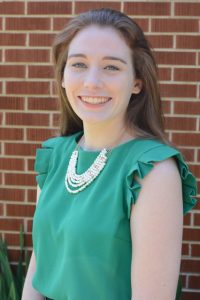Martha Grace Lowry Mize – Alumna Spotlight
 Grant Coordinator, Food Bank of North Alabama
Grant Coordinator, Food Bank of North Alabama
Hometown: Tuscaloosa, AL
BA in Anthropology, minors in Business and Southern Studies (2017)
MA in Anthropology and MA in Southern Studies (2021)
LinkedIn Profile
Why/when did you decide to study anthropology at UM?
I decided to study anthropology in undergraduate because it kept my options open. I knew I could take my degree into nonprofits, law, business, development, archaeology, etc., which was a big comfort to me as I didn’t know what I wanted to do with my life yet.
For graduate school, I knew the rigor of a four-field approach would be well respected in the anthropological community and ensure that I was prepared not just for cultural anthropology but also to teach anthropology after completing my degree. The close relationship between the Center for the Study of Southern Culture and the Department of Sociology and Anthropology was the biggest draw for me to the program, as I knew the structure of an anthropological lens would help focus the broad flexibility of the Southern Studies program.
What were some significant experiences or fond memories of your time at UM?
There is a lot to choose from….doing archaeology out at Rowan Oak was a highlight for sure, and many of the uproars of campus (the turnover of chancellors, fights for freedom of speech, and the rise of the university worker’s union) that brought forth a new togetherness in both the students and faculty in my department and Center for the Study of Southern Culture at UM. My Honors College experiences are often what I look back on most. From a class wtih Bruce Levingston (artist in residence), to my friends from Honors 101 & 102, it was how I found a community of people that, while all on different paths, all sought to put a meaningful stamp on the world.
During my graduate years, half of which were during a pandemic and remote, my cohort in Southern Studies provided me with that same Honors College diversity. My anthropology peers were my everyday constants, many of whom I still keep up with to this day. My exposure to an even wider group through my time on the UM Graduate Student Council also comes to mind when I think about memories at UM.
Please describe your educational/career path since graduation from UM.
When I graduated from undergrad, I worked for a year with an economic development nonprofit in the Alabama Black Belt (Main Street Marion) and for the David Mathews Center for Civic Life in Montevallo as their 2017-2018 Civic Fellow. I then decided to pursue my masters’ degrees finishing my Southern Studies and Anthropology Masters concurrently at UM in 2018. About a month after my last graduation, I accepted a position as the Grant Coordinator for the Food Bank of North Alabama. My goal has always been to strengthen the nonprofit sector in Alabama, and that’s what I’m currently pursuing. I plan to continue my career further in the development and fundraising fields of the nonprofit sector.
Speaking to prospective/current students, what is the value of studying anthropology in today’s world?
In this day and age where understanding diversity, both past, and present, is essential, the value of studying anthropology is that it allows you to see differences as strengths rather than weaknesses and communicate those strengths to others in meaningful ways. Anthropology isn’t just contained to one field or job title. It is important to understand that anthropology is a skill set that opens doors no matter the profession. We work in every industry and every country, so why haven’t you heard of us? We’re often known by our job titles instead of as anthropologists. Anthropologists work for governments, private research and business firms, hospitals, and Facebook (now rebranded as Meta). We become lawyers, PBS documentary specialists, cancer researchers, language experts, academics, GIS specialists, and advocates. The value of studying anthropology is understanding the walk of someone else’s shoes, whether the shoes are from a thousand years ago or those you just met, and building meaningful connections
